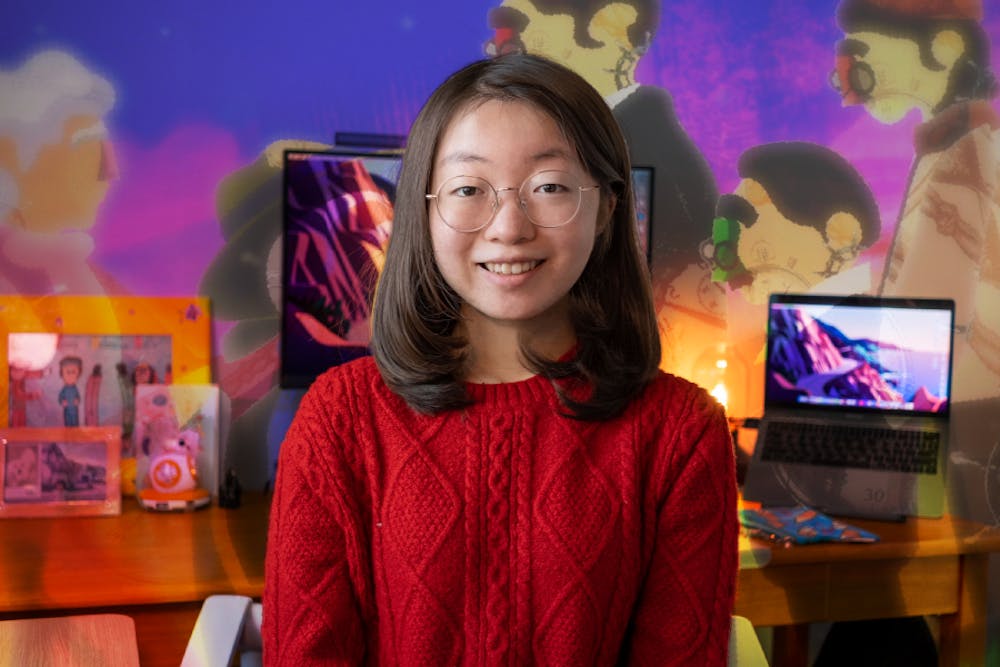When Ejun Hong (C '25) was ten years old, she struggled with an unidentifiable eye disorder that threatened her academic journey. However, as she watched various animated films, she found herself inspired. Animation felt empowering—in it, she saw something that “delivers hope, happiness, and inspiration" not only to her but to others around the globe.
For Ejun, who uses the medium to address her personal difficulties and the hardship of others, animation is a refuge. In her film, Broken Star, Ejun illustrates a broken star encouraging a heartbroken child to love himself again; consequently, he regains his ability to shine. The film, which Ejun says was created “during the times of struggle to heal [herself] and help others,” seems to reflect what animation did for her. “Those films conveyed strong and universal messages such as the importance of courage, love, and hope through their personal stories. So through those films, I was able to regain confidence and hope,” she says.
However, Ejun has since morphed her once unidentifiable world into a mirage of color. Though her films depict personal hardship, each invokes dreamlike imagery; her experimentation with vibrant colors, varied textures, and soft music elicits a sense of wistfulness and whimsy. She comments: “I tend to include a lot of symbolic images to deliver the messages that I want them to convey.” This imaginative use of metaphors allows her viewers to experience a myriad of strong, complicated emotions—sadness, regret, happiness, and hope—in a matter of seconds.
When asked, Ejun cites her 2019 animated short Mother as her proudest accomplishment to date. The award–winning film, a tribute to her 94–year–old grandfather, who lost his mother at a young age and now suffers from Alzheimer’s, explores his life, which was long and prosperous despite the challenges he faced. The short depicts their reunion, showcasing the perpetual relationship between a mother and her son. Though Ejun is only a first–year at Penn, Mother reflects the work of a seasoned animator with an already fine–tuned visual style: Every choice—be it the colors, music, scenery, or texture—seems imbued with intention and essential to the narrative. The use of clock symbolism to reflect the passage of time, for example, is a poignant touch that exemplifies her talent for visual storytelling.
Mother was deeply personal for Ejun and her family. Describing her family’s reaction, she says, “They were crying a lot and they were really responsive. So that was the moment that I really realized the power of animation.” Ejun considers this to be what cemented her passion for animation and her aspirations to work as an animator in the future.
The short film resonated not only with Ejun’s family—Ejun learned that “the most personal stories could be the most universal ones, and they could really touch the hearts of people around the world.” She urges aspiring animators who are struggling to come up with an idea to look a bit closer to home.
The technical skill and imaginative tilt that Mother reflects were not overlooked. The short won Best in Festival, as well as three additional awards—for 2D Animation, Outstanding Design, and Stand–Out International Film—at the 2019 Walt Disney Teen Animation Festival International (TAFI). Mother also won first place at the 2019 Flickers’ Rhode Island International Film Festival, which is an Oscar–Qualifying and BAFTA–Qualifying festival. In total, Ejun's films have been officially selected by over 30 international film festivals.
Ejun, who plans to major in Fine Arts, Design, or Cinema and Media Studies, shows no sign of slowing down. Currently, she’s working on an animated stop–motion film, I Am Roma, set in Slovakia, where she lived for two and a half years. When asked to elaborate, she explains, “I was like the only South Korean there. So I'm living there, and I was able to really connect with them, and I was able to understand their situation. So I wanted to help them overcome those difficulties caused by discrimination and persecution in Slovakia.” The film depicts a Romani child as she explores her culture.
Ejun cites Pixar movies such as Coco and European films as inspirations for her work. She describes how one French film, April and the Extraordinary World, convinced her that animation could convey messages of hope and inspiration through more serious and realistic stories. She also cites Japanese animator and director Hayao Miyazaki and the film La La Land, which, although not animated, she considers her favorite movie. “When I was young, I was really inspired by Walt Disney because he once said a quote, ‘If you can dream it, you can do it,’ and that really helped me through the difficulties during my childhood,” she says.
In the future, Ejun has hefty ambitions, hoping to work for Disney or Pixar animation studios; however, while this may seem like a pipe dream, her obvious talent seems to make it a question not of if, but of when. Upon viewing her evocative films, there seems to be no doubt that she’ll achieve her goal to “impact people across the globe and deliver strong messages that could help them through difficult times.”
Ejun notes that the power of animation helped her discover herself and her artistic talents, and we're all the luckier for it. Every film of hers I watched was not only immaculately crafted, but left a profound impact on me. She’s not only an incredible artist, but a powerful storyteller, and I can’t wait to see the future of her animation career take hold.

